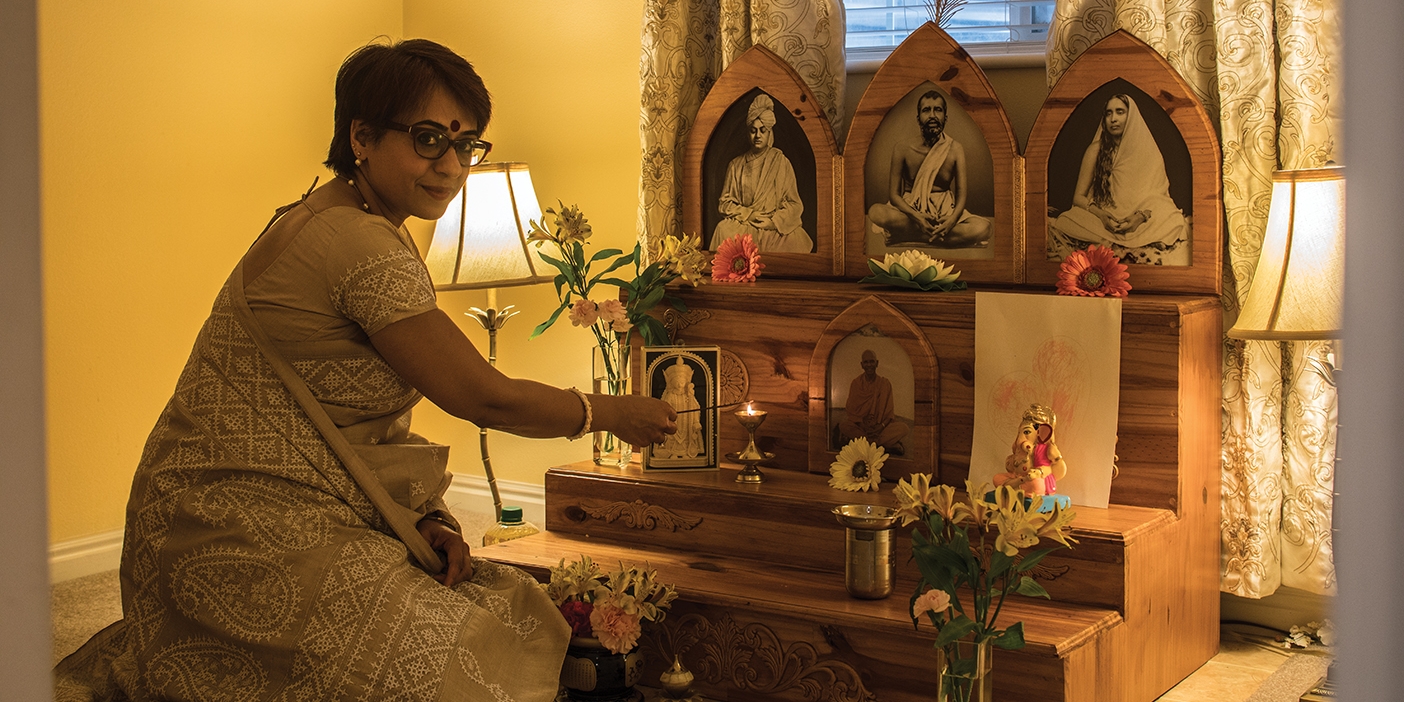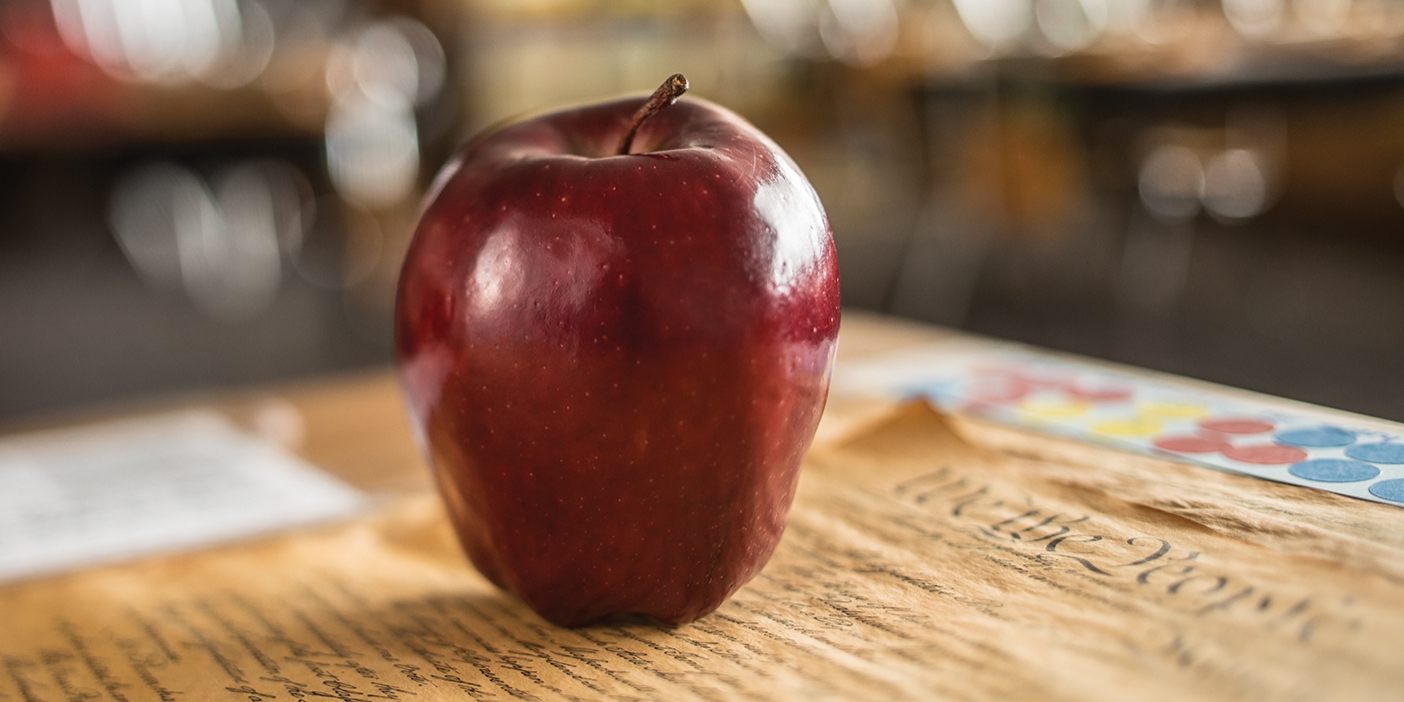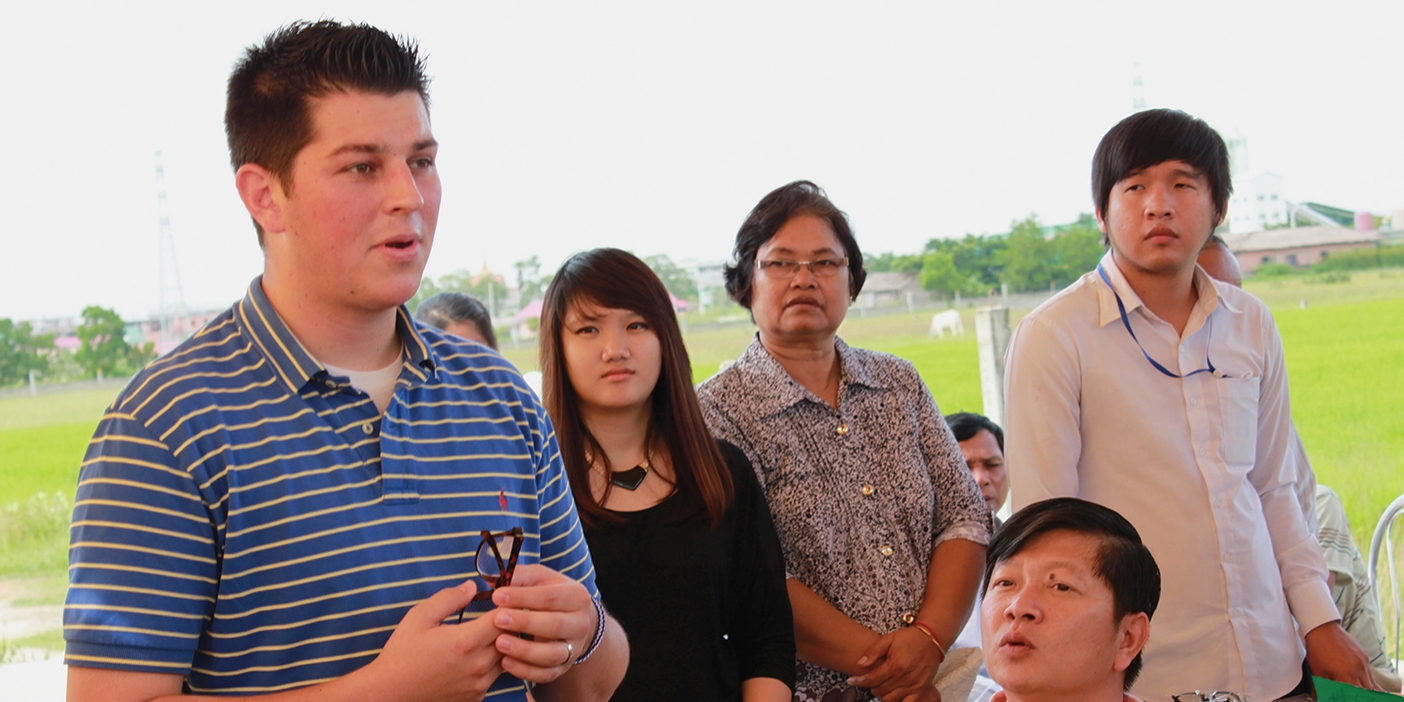Yeah Samaké beat the odds in Mali. Now he’s helping others do the same.
But Samaké envisioned a life in which his children could escape the darkness of illiteracy and break the cycle of poverty, and he saw education as the light that would show the way. Neighbors warned that not having his children out in the fields being productive would be a drastic sacrifice and that the Samaké children would go hungry.
They were right.
While attending school the Samaké children often went to bed without food and cried out of hunger. One of their parents would tie bandanas tightly around their waists so they would feel as if something were in their stomachs. Hungry and weak, they would walk across the dusty savanna punctuated with scattered trees to one of two simple frame school buildings in Ouélessébougou (pronounced way-less-eh-boo-goo). The children would sit together on wood planks and learn from the teacher, who typically held the only textbook.
Tiecourafing Samaké’s eighth child, N. Yeah Samaké (MPP ’04) (pronounced Yay SAM-a-key), now mayor of Ouélessébougou, praises his father for his vision: “My father knew we would feel deprivation from time to time, but the odds weren’t with us, anyway. When I was growing up, it was hard to survive. . . . [Forty-five percent of Malian children] would die from malaria, diarrhea, and preventable diseases. We knew the . . . challenges of staying well, but we believed in our father’s wise resolve to have us educated. He is a hero to me, and any sacrifices were worth it. We were already rich in love.”
In time, the Samakés became leading residents in Ouélessébougou. “I have known since I was in the sixth grade that we were one of the most respected families,” Yeah Samaké explains. “We had the power of education, and we were sought after because we could read the letters coming in and out of our village.”
More than 30 years later, all of Tiecourafing Samaké’s children have diplomas and degrees. Yeah Samaké, who earned a bachelor’s degree in English as a second language in his home country and later a master’s degree in public policy from BYU, insists he is not the most accomplished sibling. “Trust me,” he says, “I have brothers with doctoral degrees whose jobs range from agricultural engineering and education to high ranks in government.”
Yet Samaké’s accomplishments are impressive. He founded and serves as executive director of Mali Rising, a Utah-based nonprofit organization that improves Malian educational opportunities. In 2009 he was elected mayor of Ouélessébougou, an area that includes dozens of villages. And he is preparing to run for president of Mali in 2012.
“I have been driven by my love of my homeland and its people,” he says. “My parents made sure that I had a quality education, and I honor that. I am also shaped by the faith of my adopted LDS faith, so for me, serving Mali is also a mission.”
Because of his father, Yeah Samaké embraced education. He found a way to get a high school diploma in a community 50 miles from home. He earned a bachelor’s degree to teach only to learn the government did not have money to pay him. Still wanting to be an educator, he volunteered at a middle school where he taught English, physical education, and soccer. During this time he supported himself by working as a linguistic and cultural guide for the Peace Corps for a dollar an hour. He also worked at a radio station translating news and entertainment.
He says his students were hungry to learn. “It was rare for them to see a young man teaching in the village; in that way I was a role model. I stayed in close contact with them, and they would come to my home.”
Born Muslim, Samaké’s first exposure to Christianity came when he attended a Catholic school. “I don’t know why, but I’m the only child in my family who was sent to this school. I think it made me more responsive to the gospel later,” Samaké says. “My first exposure to the Church came through a Peace Corps volunteer who, as far as I know, was not a Mormon. When she left Mali in 1998, she gave me the books she had collected. Included in the stack was a Book of Mormon with a handwritten testimony. I read it and was impressed by its messages,” he says.
This introduction to the Book of Mormon was followed by separate encounters with a number of Church members who were in Mali for humanitarian expeditions or as tourists. With one Latter-day Saint family, he served as a guide and translator when they visited the legendary ruins at Timbuktu. He joined them in their prayers and began asking questions about the Book of Mormon. Based on his experiences, Samaké found missionaries to teach him and was baptized in September 2000.
“I joined without knowing the precepts of the Church as I do now. I was prompted to join and [was] impressed by the strong sense of family. The notion of service blew me away. I was shocked at how people would donate their time and resources. This was my idea of heaven, and [it] supports what I believe in.”
One of the Latter-day Saint families Samaké met in Mali paid for him to come to the United States and visit BYU. When he got to campus, he looked up BYU researchers he had met in Mali. They helped him obtain a student visa, and he eventually enrolled in the public policy master’s program.
“I never thought I would have had the blessing to study at BYU, and although I had an excruciating learning curve—including figuring out how to use a computer—I worked hard and continued to be impressed with the giving spirit of the people.”
As a student Samaké stood out among his classmates. Joseph G. Hadfield (BA ’03) remembers taking a challenging public policy class with Samaké. “It was a difficult class. We all kind of wondered what we’d gotten ourselves into, but Yeah had a real focus. He was majoring in public policy because he wanted to develop skills to use in Mali.”
Marissa Coutinho (BS ’07), a student from India who met Yeah in the Wilkinson Center, was less impressed.
“When I saw Marissa, I immediately approached her and told her she was the most beautiful woman I had ever seen,” Samaké says. She was not interested and made it clear over the next several weeks that he had no chance of marrying her. But they became friends, and she eventually had a change of heart.
They married six years ago and have a son and a daughter. Yeah says he considers himself the luckiest person on the planet. “Marissa has been my champion and frequent source of guidance and inspiration.”
“I don’t take myself too seriously,” he adds. “I laugh a lot and just don’t worry. I am blessed, though, to have a worrier in my family. My wife worries about the finances, our comfort, and how things will work out in Mali. If she didn’t do it, then I would probably have to worry.“
Helping Mali Rise
Addie J. Fuhriman (MA ’65), former assistant to the BYU president, visited Mali as a member of the Ouélessébougou Alliance in the late 1980s and met Samaké, who had been hired as part of a research team.
She liked him immediately. “Yeah is vibrant, upbeat, and optimistic,” she says. “He is very action-oriented, but I’m not sure he always thinks about an idea before he jumps on it. That may be because he is unafraid and fearless. He is ambitious.&lrquo;
“Am I ambitious?” Samaké laughs. “Of course I am. How else am I going to empower Mali? Although it is one of the poorest countries in the world, it has many natural resources, and I have every hope for my country. I think about the big picture and can see how things can be.”
“I’ve been able to visualize possibilities since I stepped into a classroom,” says Samaké. At school he realized that being outgoing was an advantage. “This is a family trait. I was also considered smart, and when I wanted something, I had the skills to achieve it. I believe I still do.”
The Mali Rising Foundation reflects Samaké’s zeal to help Malian children experience the same benefits of education he has received. The basic premise behind Mali Rising is that a primary roadblock in educating Malian children is the lack of school buildings—particularly middle schools.
“If we bring schools near to the people, many more of them will attend,” he says. He envisions a societal domino effect: more people will have access to education and the educated workforce will increase. There will be a larger group of people participating in the economy, which will bolster economic prospects for the country.
Mali Rising focuses on erecting middle schools throughout the country using local materials to reduce the cost of building. The Malian adobe structures also last as long as concrete and result in cooler interior temperatures, important in a hot desert climate.
“Middle schools are especially needed in Mali,” notes Yodit Solomon (BA ’92), a BYU researcher who has studied Mali. “Quite a few nonprofits build elementary schools, but what happens after sixth grade? It’s hard for students to travel 15 or 16 kilometers to the closest middle school, and there is always a danger of losing your literacy skills if you stop after an elementary education.”
Mali Rising doesn’t just give schools away. Samaké believes that villages need to develop a sense of ownership for their schools. If a village wants a school, it approaches Mali Rising with 20 percent of the cost of construction—a significant sacrifice for Malian communities. When the school is completed, the government of Mali hires and pays teachers. By the end of 2010, Mali Rising will have helped build 15 schools.
Much of Samaké’s time is spent garnering support for the organization. Fellow Mali Rising members say his passion is contagious and has prompted many to join his cause.
“Yeah embodies charisma,” says Fuhriman, “and people are drawn to him”—like Norma Gonzalez Collett (BA ’82), who works for BYU’s athletics media relations. “When I learned about Yeah Samaké, he inspired me; I wanted to help,” she says. She joined the foundation’s board and has assisted with fund-raising events and press releases. “What really impresses me is that in the United States, he has made a great life for himself, his wife, and his children. . . . Yet his heart remains in Mali, and he is willing, even eager, to leave [the United States] and make a difference in his native country.”
Collett visited Mali in 2006 for the opening of the first middle school that received support through Mali Rising. “As I listened to Yeah and the village elders and learned what it meant for them to have this school, I thought, ‘This is one of the most rewarding experiences of my life.’”
Mayor Samaké
As a young man Samaké discovered how much good could be done by organizing people. For example, he would assemble young people to clean and make repairs on their modest streets. “I’m the original grassroots person,” he says.
In college Samaké played an active role in student protests that helped lead to democratic rule in Mali in 1992. The experience left a permanent belief he describes in a personal paper about his life: “We aspired to greater freedom and participation in the public arena, which had been in the hands of very few people for a very long time. It was liberating to be part of this, and [it] increased my sense of what is possible. I felt I could make a great difference in other areas through committed action with others of a like mind.”
“Yeah is among an emerging group of young Africans determined to improve lives through better government,” says Solomon. “While he is very congenial and easygoing, Yeah is clearly committed to Mali.”
He became mayor of Ouélessébougou in 2009 after being approached by party leaders two months before the election. They knew of his work with Mali Rising, and Samaké believes they came to him because they saw him as an agent of change. “Corruption is, unfortunately, a big problem in Malian politics, and my party wanted someone who would not use taxes for personal gain.”
Samaké’s name was listed at the top of a slate of 23 candidates for council positions. If his party won, he would be mayor. “We ran on a promise of transparency and commitment to the people, and we won with almost 86 percent of the vote.”
Samaké visited each of the 44 villages that would fall under his leadership and told the residents he would not spend any of their money without them knowing where it was going. He let them know his focus would be on developing local education, health, agricultural, and economic policies.
“I was amazed to see how receptive they were and pleased about how much they knew about their needs—even their understanding of solutions for their problems,” he says. He emphasizes that his commitment to transparency has yielded results. “Before the election, you had to send armed guards to ask for tax money, and fewer than 10 percent paid. Now 60 percent of the villagers pay without military intervention, and I project that by the end of 2011, it will be closer to 75 percent compliance.”
The first thing Yeah did after becoming mayor was create a structured environment. “I could not be a mayor who decided everything and ran the show. If Mali is going to grow, it needs people—lots of people—to have influence.”
He added a council of elders with two representatives from each of the 44 villages. “They are like a board of directors to the city. They report the business of the council to their villages, including how the money is spent. It’s part of my platform of transparency and is unique to my municipality.”
Although Samaké has lived in Utah for several years, since his election he says he has spent more time in Africa than America. He has built a home in Mali and plans to move there permanently in November. When he is in Utah, he attends Ouélessébougou city council meetings and weekly staff meetings using Skype on the Internet. “This has its challenges because I have to get up at 1:30 a.m. to account for the time difference,” he says. “That is something I won’t miss when I’m living in Mali.”
As he looks toward the future and the Mali presidential elections, Samaké believes his ideas should resonate with the entire country. “You know, I’m just a common man. That’s all I’ve ever been. But I’m energized by people, and I genuinely believe the people of Mali are its biggest resource. My experiences have made me realize people can change the course of things if we are determined.”
Samaké is excited to return home. “I can do so much more good in Mali than in the United States,” he says. “My father’s vision transformed our lives. It is only right that I also make a difference.”
Feedback: Send comments on this article to magazine@byu.edu.









